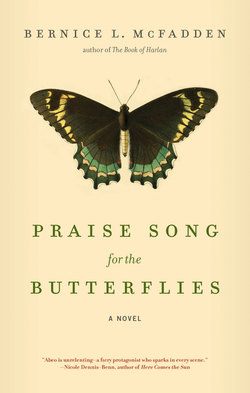Читать книгу Praise Song for the Butterflies - Bernice L. McFadden - Страница 12
На сайте Литреса книга снята с продажи.
Оглавление1
Abeo’s first memory was from a Saturday in 1978. She was two years, eight months, and twenty-three days old the morning she awoke in her parents’ large mahogany bed. The room was shrouded in the gray haze of early morning. Outside, a car engine roared to life, the rusty hinges of a wrought-iron gate squealed open, and a choir of roosters began to crow.
Abeo rubbed the sleep from her eyes, searched the room for signs of her parents, and in her quest caught sight of her dark face and button nose in the oblong mirror that hung over the chest of drawers.
Abeo yawned before calling out, “Mama!” over and over until her mother, Ismae Kata, appeared in the doorway.
“What is all this noise, little one, heh?” Ismae cooed. Abeo grinned and raised her chubby arms.
Ismae was slight in build, with the fingers of a pianist—long, thin, and elegant. Her cocoa-colored skin was unblemished, and fragrant with gardenia-scented soap. She lifted Abeo from the bed, set her on her hip, and carried her into the dining room where she placed the little girl into a chair directly across the table from her father, Wasik Kata.
Wasik was reading the Daily Mirror newspaper. Abeo could see his shiny, creased forehead floating above the top of the page.
“Good morning, Papa!” she sang.
Wasik lowered the paper to reveal a square chin and a wide, flat nose that barely supported his thick black-framed glasses. He flashed a gap-toothed smile. “Is that little Abeo?”
She nodded her head vigorously. “Yes, Papa, it’s me!”
“No, you cannot be Abeo,” he teased. “Abeo is a sleepyhead who never rises this early.”
“It’s me, Papa, it’s me!”
Ismae laughed and placed a loving hand on her husband’s shoulder. “Hurry now, you don’t want to be late.”
The Kata family lived in an affluent section of Port Masi known as the Palm Tree Residential Area. It was a neighborhood comprising expensive homes shaded by the fronds of towering palm trees. They lived in a lovely one-level, mahogany-shingled home with sweeping front and back verandas, tiled floors, and louvered windows. The kitchen was spacious and fitted with all manner of modern conveniences, including a refrigerator that dispensed water from the door and made ice cubes in the freezer.
Wasik and Ismae were from Prama, a rural village located in the Zolta region of Ukemby. Wasik left Prama as a young man, traveling to Port Masi to live with an older brother who, recognizing the intelligence and potential of his younger sibling, eventually sent him off to England to receive a formal education. After graduating from university, Wasik returned to Ukemby and found employment as an accountant in the government’s treasury department. He and Ismae had played together as children, but had not seen each other since he’d left Prama. The next time he laid eyes on her, he was reading the Daily Mirror and there she was in the newspaper, smiling seductively from the passenger seat of a luxury automobile.
He called the paper and they connected him with the talent agency of which Ismae was a client. Three days later, they had dinner. Four months after that, he proposed and she agreed to become his wife.
That was some years ago, and with the arrival of Abeo, Ismae had exchanged her modeling career for that of a primary school teacher. Wasik was concerned that this new domesticated life was too boring and unfulfilling for a woman whose face had graced advertising billboards, fashion magazines, and who was once rumored to be keeping romantic company with an English nobleman.
Whenever he asked, “Do you miss your other life?” Ismae understood this to mean: Are Abeo and I enough for you? Ismae’s response was always the same—she’d take Wasik’s face tenderly in her hands, press a gentle kiss to his lips, and say: “There is nothing to miss. You and Abeo are the life I’ve always dreamed of having.”
This would quell Wasik’s insecurities for the moment. Though for the life of their union, Wasik would continue to raise the question.
They were a privileged family. Wasik drove a silver Mercedes and had his eye on a piece of beachfront property in Tako, where he hoped to build a second home where his family could spend their holidays. Eventually, of course, he and Ismae would retire there, enjoying their golden years by the ocean and spoiling the many grandchildren he imagined they’d have.
They were practicing Catholics, having converted when missionaries came to their village and warned them that they would be damned to hell if they refused to accept Jesus Christ as their Lord and Savior.
Wasik’s parents had balked at a religion that only recognized one supreme being and ignored the spirits, ancestors, and minor gods who tended to the sun, river, moon, and animal and plant kingdoms—and so would not allow Wasik to discard his traditional religion for a white god with blond hair and blue eyes. Wasik had to wait until he was out from under his parents’ influence before he could convert. Ismae’s parents, however, bought in hook, line, and crucifix.
